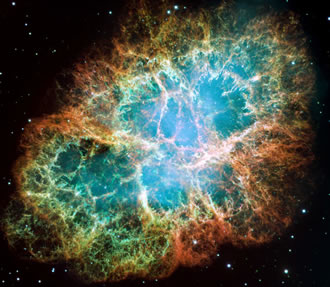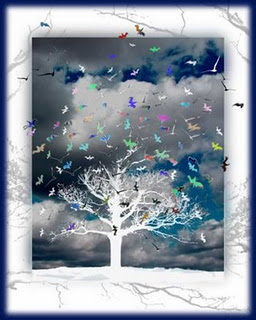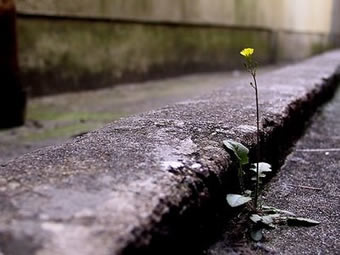Intimately Acquainted with All My Ways
For Sunday January 15, 2012
Lectionary Readings (Revised Common Lectionary, Year B)
1 Samuel 3:1–10, 11–20
Psalm 139:1–6, 13–18
1 Corinthians 6:12–20
John 1:43–51
In December astronomers reported that they had found the biggest black holes ever in the universe. Black holes are regions at the center of galaxies where gravity is so powerful that not even light can escape. "One of these newly surveyed monsters," writes Dennis Overbye in the New York Times, "which weighs as much as 21 billion Suns, is in an egg-shaped swirl of stars known as NGC 4889, the brightest galaxy in a sprawling cloud of thousands of galaxies about 336 million light-years away in the Coma constellation."
 |
Mind-boggling measurements like these once caused the physicist Richard Feynman to remark that "it doesn't seem to me that this fantastically marvelous universe, this tremendous range of time and space and different kinds of animals, and all the different planets, and all these atoms with all their motions, and so on, all this complicated thing can merely be a stage so that God can watch human beings struggle for good and evil — which is the view that religion has. The stage is too big for the drama."
Feynman's dismissal of religion isn't required by science; it's a personal and philosophic extrapolation. But he certainly speaks for many elite scientists who influence society with their (scientific) prestige. And, let's be honest, Feynman also speaks for many ordinary people when they contemplate the scope and scale of time and space. It's enough to make you wonder: am I only a cosmic accident among billions of galaxies?
I'm grateful for the gift of science. But science isn't the only way to know, and the material world isn't the only thing worth knowing. Science is a powerful means to knowledge, but by itself it's a means without any obvious ends. And all too often science becomes a means that refuses or transforms all ends that would constrain it — instead, what's technologically possible can and will be done, period. But science can tell you how to build a bomb, but not whether you should use it. It can help an infertile couple conceive a child, but not how to love that child.
So I thank God for science, but for a more robust view of our lives and the world we need to include poetry. John McDargh of Boston College recommends "the perennial power of poetry as a privileged medium." Poetry, he says, "tunes the 'ears of the heart' to the real way in which human beings most honestly and most deeply talk about their lives when they are speaking from the core of their experience. The reason for this has everything to do with the unique power of metaphor to carry thought forward."
 |
Psalm 139 for this week is a case in point. Yes, God is infinite, but the psalmist also describes God as intimate — "intimately acquainted with all my ways" (NASB). Whether I feel like it or not, whether I believe it or not, I'm always safe in the presence of God's Spirit: "If I go up to the heavens you are there; / if I make my bed in the depths, you are there." Instead of feeling like a demographic accident among seven billion people, every human being can say, "you created my inmost being; / you knit me together in my mother's womb. / When I was woven together in the depths of the earth, / your eyes saw my unformed body."
The story of the little boy Samuel reminds us that the God who created us and cares for us also calls us. As he tossed and turned one fitful night, three successive times "the Lord called Samuel." It was Samuel's part, advised Eli the priest, to respond to that divine call: "speak, Lord, for your servant is listening." That divine call and human response echoes down to us today. It's repeated in John's gospel this week when Jesus leaves for Galilee, and finding Philip says to him: "Follow me."
God's call invites our response. When he speaks, we need to listen. To listen and pay attention, says Mary Oliver, is both harder and easier than it seems. In her poem The Summer Day, Oliver describes attentiveness as a form of prayer:
I don't know exactly what a prayer is.
I do know how to pay attention, how to fall down
into the grass, how to kneel down in the grass,
how to be idle and blessed, how to stroll through the fields,
which is what I have been doing all day.
Tell me, what else should I have done?
Doesn't everything die at last, and too soon?
Tell me, what is it you plan to do
with your one wild and precious life?
Similarly, in her poem Praying, she suggests that when we quiet ourselves and pay attention, we create a space "in which another voice may speak."
It doesn't have to be
the blue iris, it could be
weeds in a vacant lot, or a few
small stones; just
pay attention, then patch
a few words together and don't try
to make them elaborate, this isn't
a contest but a doorway
into thanks, and a silence in which
another voice may speak.
 |
Life, writes the British poet David Whyte in his poem The Opening of Eyes, "is no passing memory of what has been / nor the remaining pages in a great book / waiting to be read. / It is the opening of eyes long closed." It's paying attention to the God who creates, who cares, who calls and who speaks. And it's responding with the little boy Samuel: "Speak, Lord, for your servant is listening."
NOTE: See John McDargh, "Imagining the Real: The Art of Poetry and the Art of Pastoral Attending," Pastoral Psychology (March 2011).
For further reflection
"In the past, God spoke to our forefathers through the prophets at many times and in various ways, but in these last days he has spoken to us by his son." Hebrews 1:1.
Image credits: (1) NASA; (2) WhyIslam.org; (3) WhyIslam.org.





